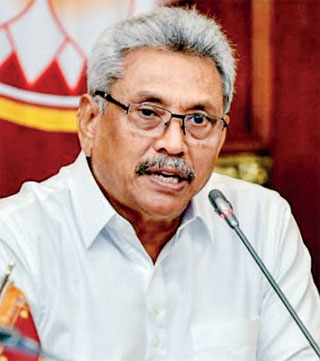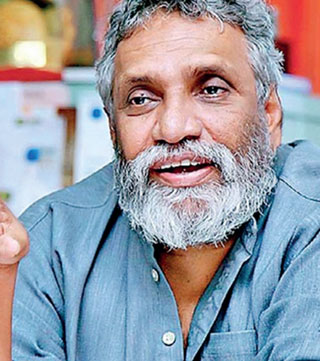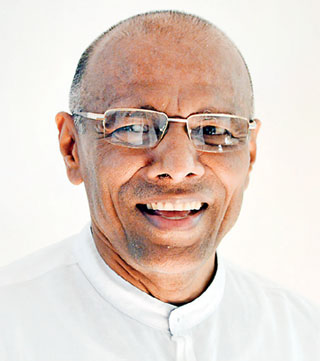Wednesday Feb 18, 2026
Wednesday Feb 18, 2026
Friday, 11 March 2022 01:29 - - {{hitsCtrl.values.hits}}

President Gotabaya Rajapaksa

Election Commission former Chairman Mahinda Deshapriya

Nagananda Kodituwakku
|
 The prime issue contained in the petition filed by Nagananda Kodituwakku making the Bribery and Corruption Commission, its chairperson and its members, and the Election Commission, its former chairmen and members as respondents, can be described as an important topic that reflects the extent of decline and deterioration suffered by the Sri Lankan State and its system of institutions.
The prime issue contained in the petition filed by Nagananda Kodituwakku making the Bribery and Corruption Commission, its chairperson and its members, and the Election Commission, its former chairmen and members as respondents, can be described as an important topic that reflects the extent of decline and deterioration suffered by the Sri Lankan State and its system of institutions.
The petition contains three issues; one is about a grave injustice the petitioner himself had suffered in connection with the Presidential Election. He had relinquished his citizenship of the United Kingdom in anticipation of contesting the presidential election which he was denied as the party that had agreed to nominate him refused to give him nominations at the last minute. The alleged charge made against Mahinda Deshapriya, the former Chairman of the Election Commission that he has committed a punishable offense consciously by accepting nomination of Gotabaya Rajapaksa offering him a chance to contest the election despite the grounds available for rejecting his nomination, can be considered the main issue of the petition.
His third allegation is about the failure of the Bribery and Corruption Commission to investigate a complaint lodged by him against the Election Commission, including its chairman and the members of the Election Commission for committing corruption by not investigating it. Of these three issues I don’t intend to analyse all of them. My focus will be on the dreadful story of allowing Gotabaya Rajapaksa to contest the election contrary to the law when he had a serious disqualification for contesting.
In this case, Nagananda blatantly accuses Mahinda Deshapriya, the former chairman of the Election Commission, who could be considered as one of the most popular figures among Government officials. The former Chairman of the Election Commission is someone I have known as a friend for a long time. I am not happy at all for having had to criticise him which is not beneficial to him. But I must admit that I am compelled to do so considering the importance of this issue.
|
Right to vote and the Election Commission
Since Nagananda’s fundamental rights petition is about the last Presidential Election, I feel it is appropriate to begin this analysis with a general assessment of the right to vote. According to the Constitution the Republic derives its power from the people of the country who are the owners of sovereignty. They exercise their sovereignty by using their voting rights in elections such as the Presidential, Parliamentary and Provincial Council elections. Of all these elections, the Presidential election is the most important as far as the power of the State of Sri Lanka is concerned. The President has all the power in the State.
The presidential election can be considered as the main election as it is the one that determines the state power of the country and the head of state. Elections have been acknowledged as the essence of democracy. The Supreme Court has recognised in a judgment that the right to vote is an essential element of freedom of expression. Therefore, matters relating to electoral process are considered to be matters pertaining to the jurisdiction of the Court of Fundamental Rights. The Election Commission acts as the authorised authority in conducting Presidential, Parliamentary, Provincial Council and Local Government elections.
The Election Commission of Sri Lanka is not as advanced as the Election Commission of India. India enacted its Election Commission on 25 January 1951. Sri Lanka enacted its Election Commission on 3 October 2001, 51 years after India. Yet, if the Election Commission of Sri Lanka which was set up 51 years after India remains far behind the Indian Election Commission, it would not be difficult to understand the degree of backwardness of Sri Lanka on the subject of constitution making compared to India. In setting up the Election Commission, it is obvious that Sri Lanka has not taken into consideration the Election Commission of India at all, which had earned a greater recognition in the world.
An election is a process. It is a statutory responsibility of the Elections Commission to ensure that the entire process is maintained as free and fair, and in accordance with the law. Generally, the Democratic countries have strict rules and regulations in controlling election funds and election expenses. In Sri Lanka, too, there were strict rules for that until 1978. It was after 1978 that an era of anarchy with no rules for election funds and election expenses began. It can be said that it has created a corrupt system in which the people could be bought over for money.
Disregard of the need to control election funds or expenditure when the election commission was set up in 2001 under the 17th Amendment or even in 2015 when it was reconsidered under the 19th Amendment reflect that neither of those reforms had any intention of making a profound change in the existing corrupt system except for giving it a quasi-beautiful appearance. During 2010-2015, the cost of the presidential election of the two main parties was estimated at Rs. 3 billion per candidate. Needless to say, it’s a huge amount of money. As usual in presidential elections, candidates used to secure such big money from the holders of black money.
As stated earlier, Nagananda Kodithuwakku has based his fundamental rights petition primarily on the neglect of duty by the former Chairman of the Election Commission in accepting nominations during the last Presidential Election. The alleged negligence of the head of the Election Commission he has pointed out was not due to an oversight but an act of deliberate negligence. According to him, the Chairman of the Election Commission has deliberately neglected his responsibilities as explained below.
There were 36 prospective candidates who had expressed their intention to contest the presidential election by making the security deposit in advance. There were two prospective candidates of the People’s Alliance who had deposited money among them. They are Gotabaya Rajapaksa and Chamal Rajapaksa. However, although Chamal Rajapaksa was present on the day of the nominations, he did not hand over the nominations. Under the Presidential Election Act, 1981 those who hand over nomination must declare in an affidavit that they do not fall under any of the disqualifications described in Article 91 of the said Act.
Under the law that was in force at that moment, a dual citizen was not entitled to contest the presidential election. On 13 May 2009, a person called Oshala Herath from Piliyandala had informed the Chairman of the Election Commission in writing that two persons namely Gotabaya Rajapaksa and Nagananda Kodithuwakku who can be considered as dual citizens, have already commenced campaigning for the forthcoming Presidential Election and it is contrary to the law to contest the election while being dual citizens and therefore requesting him to closely scrutinise their applications when nominations are submitted.
Although Gotabaya Rajapaksa submitted an affidavit on 6 October 2019, certifying that he has no disqualifications as required by the Presidential Election Act and the Constitution; but the affidavit did not include a copy of the Certificate of renunciation of Citizenship issued by the US State Department. Gotabaya Rajapaksa was not in a position to present a certificate obtained from the US State Department for that purpose because his name was included in the list of those who had renounced their American citizenship, which was released by the US State Department on 5 August 2020, which was after the Presidential Election.
Accordingly, he had relinquished his American citizenship on 31 March 2020 which was after the Presidential Election. For whatever reason, the two main candidates who had submitted nominations for the Presidential Election did not object to Gotabaya’s nomination. The gruesome part of the story unfolds only after that.
The Chairman of the Election Commission accepted the affidavit submitted by Gotabaya along with his nomination papers affirming that he was not having any disqualifications without a certificate from the US State Department to prove that he had renounced his American citizenship. The chairman of the Election Commission should have asked him to produce proof of renunciation of American citizenship with the affidavit.
Nagananda Kodithuwakku maintains that it cannot be considered as a mistake made by the Chairman. It could be described as an illegal favouration extended to Gotabaya Rajapaksa who was in a desperate situation being unable to meet his qualifications to contest for the presidency, thereby enabling him to overcome a difficult hurdle without being put to test.
|
Professor Hoole’s version
The story narrated by Professor Ratnajeevan Hoole, a former member of the Election Commission who is also a respondent in this case, is extremely alarming. In an affidavit filed before the court he states to the court that he was aware of his responsibility as a member of the Election Commission in ensuring the constitutional right of the people to have a free and fair election (Article 103 (2)) and that he had taken all possible steps to fulfil that responsibility.
He further states that when he pointed out to the Chairman of the Commission that it should consider whether Gotabaya Rajapaksa who presented nomination for presidential election from the symbol of Pohottuwa had in fact formally renounced his American citizenship, the Chairman had told him that it was not the responsibility of the Commission; and it was up to the Supreme Court to decide. When he questioned the Chairman on another occasion about this issue, the Chairman had stated that the other candidates too have the right to raise the issue through objections on the nomination day and therefore the Commission should wait allowing them to do so.
Meanwhile, he had come to know that the Chairman of the Commission had betrayed him to the election team of Gotabaya which had caused a great fear in him about the safety of his life: and none of the other candidates raised the issue on nomination day and the Chairman of the Commission also not inquired into the matter; the professor has further stated in his affidavit that he had to remain silent being unable to take necessary steps to carry out his duties in accordance with the law as he had been intimidated by the circumstances.
After a careful review of the facts outlined in the preamble to this fundamental rights petition, it is not difficult to realise that there had been a massive and deliberate fraud in the nomination process in the last Presidential Election. If it were not for that fraud, President Gotabaya Rajapaksa would not have been able to contest the Presidential Election.
The fact that two members of the same family (Gotabaya and Chamal) had deposited the mandatory security amount to contest the election suggests that there was a doubt among the family members as to whether Gotabaya would be able to receive nominations. In the end, Gotabaya Rajapaksa seems to have been able to obtain nominations without hindrance, regardless of his disqualifications through some unique and invisible system that had silenced or inactivated all possible areas where his eligibility to contest the election could have been questioned or scrutinised.
It is not difficult to understand the role of the Chairman of the Election Commission in this issue. It is clear that the system of Independent Commissions established in Sri Lanka is very weak and does not have a strong foundation to ensure an independent existence of it. The failure of the system of Independent Commissions can be realised from this incident which is the latest addition to the gamut of examples reflecting the weakness of the system. What is important is the discretion exercised, not in ordinary times, but in unordinary situations.
According to Article 14 (1) (a) of the Presidential Election Act No. 15 of 1981, objections may be made to the nomination papers of a candidate by any candidate or the person (party secretary) who has signed the nomination paper of such candidate on the ground that it is apparent from the content of the nomination paper that the candidate is not qualified to be elected as president, in writing and made to the Commission between 9 a.m. and 11:30 a.m. It is the responsibility of the Election Commission to investigate the validity of such an objection immediately, and if the candidate whose nomination is questioned fails to refute the allegation of disqualification on the basis of credible evidence, the Commission should reject the nomination of the candidate. The person who has lost the nomination can then resort to the Supreme Court against the decision of the Commission if he so desires.
The issue of whether Gotabaya Rajapaksa had renounced his American citizenship formally when he handed over the nominations for presidential election did not remain a hidden secret; it was a well-known issue debated openly. Why didn’t the two major rival applicants who contested against Gotabaya make a protest by raising a fundamental objection? If both of them or one of them had raised an objection, it would have posed a serious problem not easy even for the Election Commission to suppress. Why didn’t the two rival candidates see Gotabaya’s citizenship issue as a serious reason to raise an objection? Was it because they failed to assess the significance of it? Or was there an invisible hand behind, influencing them? What could the Judiciary do if it is proved that there had been a planned fraud in the process of nominations? It is an important issue that deserves to be addressed by legal experts.